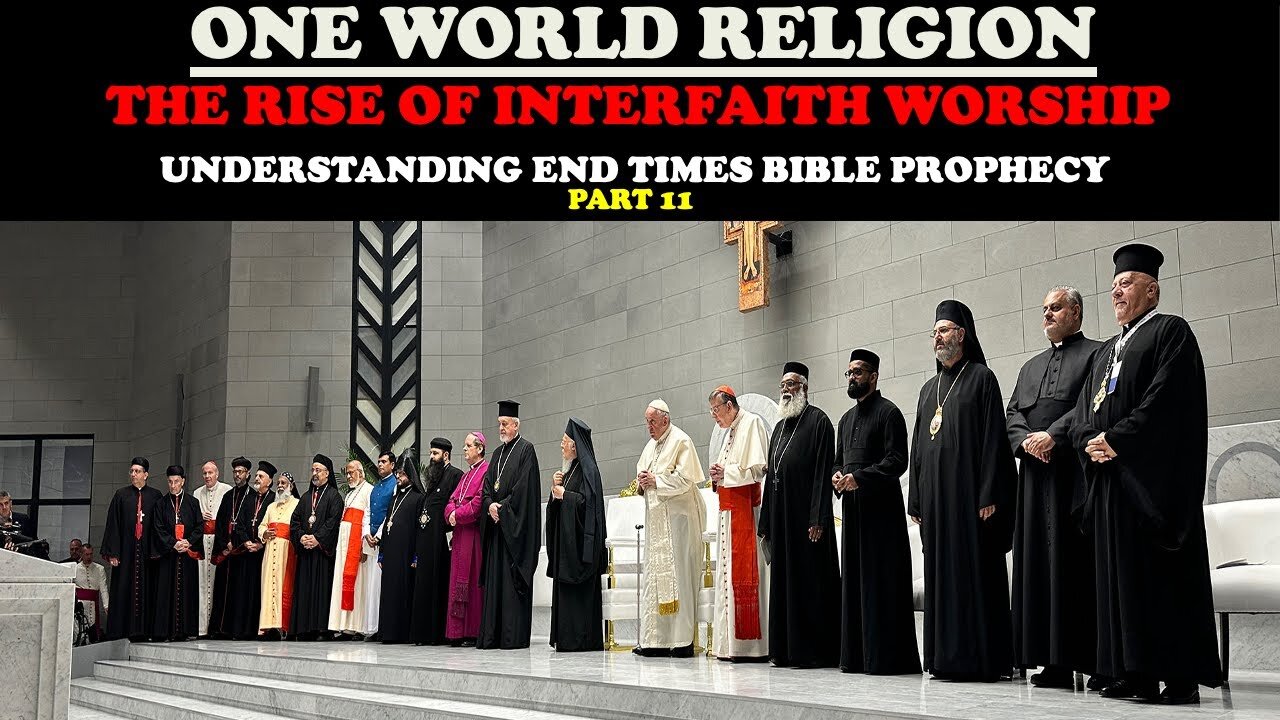Up next
Learn the Bible in 24 Hours - Session 21 with Chuck Missler
WHAT DOES THE BIBLE SAY ABOUT THE SHAPE OF THE EARTH?
BREAKING: Putin’s Peace Deal REJECTED By NATO! - Stay Free 387
BREAKING NEWS: Putin Offers Peace Proposal to Ukraine
President Putin outlines conditions for peace
What Does The Bible Say About Transgenderism
How Can BIDEN Talk Peace While Arming NEO-NAZIS? – Human Rights Lawyer to UN
The Russia-Ukraine war may have killed 1M people. Why is there no real push for peace?
"Basics Of The Bible - Part 2" - Pastor Ryan Dean
ONE WORLD GOVERNMENT: UNDERSTANDING END TIMES BIBLE PROPHECY PT. 10
ONE WORLD RELIGION: THE RISE OF INTERFAITH WORSHIP (UNDERSTANDING END TIMES BIBLE PROPHECY PT. 11)
THE GREAT TRIBULATION: THE WRATH OF GOD IS ON THE WAY (UNDERSTANDING END TIMES BIBLE PROPHECY PT. 12
‘Peace summit’ over Ukraine conflict didn’t accomplish anything – political analyst
The Hebrew Name of God in the Bible - Jehovah is a mixture of
Putin sets out Russia's conditions for peace talks with Ukraine
Things Science Says The Bible Got Right
Does The Bible Present Jesus as God? #Shorts
Hebrew Expert Finds Translation Error in the Bible That Rewrites History | Dan McClellan
Pakistan Desperately Appeals to India for Peace | Discussion on Jammu & Kashmir? World Affairs
Jon Zherka PREACHED The Bible to OF Model And She FINDS JESUS
Christianity = Peace?
The Bible was EDITED ✏️
Bible Scholar Responds to Ammon Hillman: Was Jesus Christ a Trafficker? | Dan McClellan
Why the King James Bible is the #1 WORST Translation | Dan McClellan
Bible Study with Pastor Paula White Cain and Minister Jonathan Cain
Identifying Bible Interpolations TheFalse Pen of the Scribes!
Blasphemers Bible - 1 Samuel
WOKE Democrats have changed the definition of women. Protect Title IX
Trump will return to Reagan’s ‘peace through strength’ style of foreign policy
'How Can I Keep The Peace Between Side Chick & Baby Mama?'
They LIED About The BIBLE'S God For Over 2,000 Years | DOCUMENTARY
West can’t talk about peace while arming neo-Nazis – human rights lawyer to UN
Russia proposes Ukraine conflict peace plan as Western powers fuel fighting
Bible Belt State Votes To Secure Abortion Rights Protections?
His Glory Bible Studies - Isaiah 1-4
Redacted Presents: Peace, War and 9/11
51623 Bible by Billie Beene E119 Ps 39 A Cry for Help!
Bible by Billie Beene 102722 E9 Ps 18 P2 V 17-29 Pass Tr - O Death! Where is your sting?
Bible by Billie Beene 8-16-22 New! E79 Ps 6 Passion Tr. A Cry for Healing! (Morning Prayer)
Bible Definition of Repentance
Basic Skills for Teaching the Bible Module 1
Bible Definition of Peace
Bible Definition of Peace See Full Lesson - https://biblicaldefinitions.com/bible-definition-of-peace/ #PeacefulHeart #InnerPeace #WorldPeace #PeacefulMind #HarmonyAndPeace #PeacefulLiving #PeaceWithin #PeaceOnEarth #PeacefulSoul #SerenityNow Key Takeaways: The biblical definition of peace extends beyond the absence of conflict. In Hebrew, peace is represented by the word “shalom,” which denotes making amends and restoring wholeness. The Greek word for peace is “eiréné,” emphasizing unity and the bringing together of different parts. Jesus offers peace with God, others, and ourselves. Understanding the biblical perspective on peace can bring inner tranquility and harmony in our lives. The Etymology of Peace in the Bible The word for peace in the Bible has deep roots and origins in both Hebrew and Greek. Understanding the etymology of peace helps us grasp the richness of its meaning in the biblical context. In Hebrew, the word for peace is “shalom,” which comes from the root word “shalam,” meaning to make amends or restore something to completeness. The concept of shalom goes beyond the absence of conflict; it encompasses completeness, soundness, and welfare. It implies making restitution and bringing something or someone back to a state of wholeness. In Greek, the word for peace is “eiréné,” derived from the root word “eiro,” meaning to join or bind together. Eiréné emphasizes unity and the bringing together of different parts to form a whole. It speaks of harmony, reconciliation, and the restoration of relationships. The etymology of peace in the Bible reveals a profound understanding of peace as a state of wholeness, restoration, and unity. The Hebrew and Greek words for peace convey the idea of completeness and the mending of brokenness. This gives us a deeper appreciation for the biblical perspective on peace and its significance in our lives.
- Top Comments
- Latest comments


















































